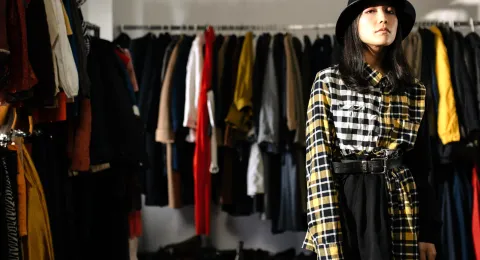Sustainability-oriented clothing companies have reacted to the growing demand for sustainability and developed new business models that are based on the reuse of clothes, shows a study conducted at LUT.
Clothing rentals are an example of such business model innovations. Rental services for clothes are based on subscriptions – a concept we’ve grown accustomed to from streaming services: consumers pay a monthly fee for access to the service. The number of items customers can rent and how long they get to keep them depend on the subscription plan. One-time rentals are also possible. Some subscriptions even include stylist or repair services.
Minttu Laukkanen, post-doctoral researcher at LUT Business School, says that the most sustainable clothing item is the one you keep wearing over and over. The life cycle of a piece of clothing should be as long as possible, but also the intensity of use is important.
“You should always be able to recall what’s at the back of your wardrobe. To achieve that, you should distinguish the concepts of sustainable clothing and sustainable product use. The manufacture of a sustainable piece of clothing starts with design, and sustainable product use leads to a long life cycle and intense use. New business models such as rental and loaning services support that,” Laukkanen analyzes.
Eleven different business models identified
She goes on to say that the value proposition of a clothing rental business model combines environmental, social, and economic sustainability.
“Ideally, everyone would have a set of go-to essentials that they wear frequently. In addition, consumers could utilize shared wardrobes to add variety and find styles for special events like Christmas parties.”
LUT’s post-doctoral researchers Minttu Laukkanen and Nina Tura have examined clothing industry business models at length and have published a number of studies on the topic area. The most recent one, Toward a sustainable sharing economy with business model innovations in the clothing industry, was published in November 2023. It identifies 11 types of business models that boost the use of unused or underutilized clothes – in other words, extend their life cycles and intensify their use. Clothing rental services are one of those business models. The study was based on interviews with 26 sustainability-oriented Finnish clothing companies.
Laukkanen says that the reuse of clothing (second-hand, shared, or borrowed) is not only an environmentally sound choice – it’s also cost-effective for the consumer and a new business opportunity for companies.
“For example, when clothing brands have realized the scale of the second-hand market for their products in online marketplaces, they’ve started to wonder why they're not cashing in on it themselves.”
Traditional players are also launching new services
Laukkanen sees a need for a sustainable fashion renewal, and different business models play a significant role in it. Which business model suits which company depends on the context, such as the product type, materials, value of a used product, and resources available. For instance, clothes appropriate for rental are highly durable, washable, and fit a variety of body types.
To many, clothing rentals are not only an unfamiliar concept but also inaccessible as a service. Rental services in Finland, such as Vaatepuu (in Helsinki, Turku and Järvenpää), Vaaterekki (Helsinki), Mallaamo (Oulu) and Tanttu (Seinäjoki), reach only a fraction of the consumer base.
“Nonetheless, the clothing industry is constantly evolving. Even conventional actors have launched new services and show interest in ones like renting or borrowing.”
According to Laukkanen, we should be stepping away from low-cost fast fashion. The sustainable fashion renewal should be consistent. Ultra-fast fashion should be banned, and the EU is already taking measures to that end.
Laukkanen underscores that the problem is, in fact, fast fashion – not fashion in general.
“Fashion involves much more than the use of natural resources. For many, fashion is a form of self-expression, a way to feel confident, a source of joy, and much more. Fashion should still be produced and consumed sustainably, and business model innovations, such as clothing rentals, play a key role in that.”
More information:






